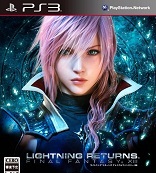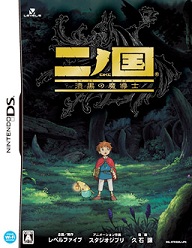Pokemon Mystery Dungeon: Blue & Red Rescue Team
Nintendo DS
Reviewed: 05/10/2007
 Main-series Pokemon games have enjoyed many spinoffs over the years. The Red and Blue versions of Mystery Dungeon represent the first duo to enter the dungeon-crawling RPG subgenre. And they make a pretty good showing.
Main-series Pokemon games have enjoyed many spinoffs over the years. The Red and Blue versions of Mystery Dungeon represent the first duo to enter the dungeon-crawling RPG subgenre. And they make a pretty good showing.
This is said despite a few immediately obvious flaws, the most notable being an awkward interface. Menus here feel a bit disorganized, and there’s a serious lack of time-saving shortcuts, options, and select-all functions. For example, when selling items, if the player has nine Blast Seeds to get rid of, he/she will have to select one, choose “sell,” go through a line or two of dialogue about selling it, and then finally make the deal nine times. A “Sell all of this” would have worked wonders, but the closest thing is an option to sell every single item in one’s inventory–no happy medium. Mystery Dungeon was made for both Game Boy Advance and the DS, and DS users don’t have much added to their version. The stylus control is flakey and useless, and the things shown on the top screen (also viewable with a button press on GBA) are things that the player rarely need really look at.
But Mystery Dungeon is solid where it matters most: the dungeon-crawling. Longtime fans of this type of game will compare it to Rogue and Nethack, and rightly so; the influnces are all over the place. Players attack randomly generated dungeons, one floor at a time. While inside, they’ll have to battle enemies as well as their own hunger. Dying will result in the loss of any money being carried, losing most of one’s items, and being sent out of the dungeon. Dying is also where the connectivity between the Red Rescue Team and Blue Rescue Team versions comes in handy. By giving a password to a friend with either version of the game, he/she can enter the dungeon a player is stuck in and help out, be that by simply rescuing the party, giving food, or whatever. Dungeonplay in this game is pretty fun. Even though the makeup of the game calls for repetition, this was quite expected, to say the least. After all, it is not only a dungeon cralwer, it’s a Pokémon game; anyone honestly surprised by repetition here should probably not be playing video games.
 |
| In the DS version, the top screen generally shows something useless. |
The Pokemon adaptation of the “Roguelike” formula casts all characters as Pokemon, including the player, and naturally features most of their famous moves and abilities. To get a feel of what monster avatar would best suit the player, the game begins with a short personality quiz not unlike the ones used in teen demographic-targeted magazines (not that this reviewer ever read any of those!), ending with a “you are _______” message. Of course, the player can restart the game and try different answers if dissatisfied. (Take the test yourself here.) From there, the player’s character will interact with other Pokemon, all of which speak in full, coherent sentences, as opposed to just saying their names like in the anime or other Pokemon-series games. This is nifty because it shows players a better look at the personality of each of these monsters that have graced their screens so many times before.
Pokemon Mystery Dungeon: Red/Blue Rescue Team‘s plot centers on the human-controled Pokemon, in a story where he/she was once a human, but has somehow turned into a cutesy monster. A search for truth ensues. Perhaps unexpectedly, the story, while kid-targeted and lacking themes such as eternal torment, death by fire, drug use, and prostitution, actually holds the game together pretty well.
Graphics and music are pretty much capped at what the GBA can handle, which might upset some of the more fickle DS owners. But again: does anyone really play dungeon crawlers, Pokemon games, or even DS games for that matter, with graphics as a top priority? Grahical limitation is not a flaw here. Repetitious music is sometimes annoying, though.
 |
| Pichaku: “Ready to #### somebody up, Charmander!?” Charmander: “I keep it the #### REAL, M###########!” |
Going against the reputation of its subgenre forefathers, Pokemon Mystery Dungeon is an easy game. Early on, the player might have some struggles, but it won’t be too long before one has things figured out to where survival of any given task is highly expected. That’s sad, because the exhileration that comes from not knowing if one will have enough food for the trip, fearing tough enemies, and feeling the pressure of skillful dungeon navigation and inventory management are great, great feelings for players to experience and a selling point for dungeon crawlers. It might have been the case that, since this is a Pokemon title, seasoned drungeon crawl developer Chunsoft anticipated many players being in their first such game, and taken the difficulty down a few notches from the norm. Even with the decline in difficulty, the game remains entertaining, and its nature makes it a good handheld.
It should also be noted that unlike regular Pokemon games, there will be no “catching ’em all” here, and in fact, new party members are not all that common. There is also a lack of two-player cooperative play. That would have been nice. But again, what’s there is pretty fun, especially for those who enjoy dungeon crawlers.
Pokemon Mystery Dungeon could have really benefited from cooperative gameplay and some increased difficulty. Nevertheless, it boasts fun dungeon crawling, an entertaining story, and mission-based play ideal for handheld gaming. It’s not the great game it could have been, but it is solid enough.
-Heath Hindman
| Score Breakdown | ||
| Overall Good Out of 10 See our Review Criteria |
Gameplay | Good |
| Story | Very Good | |
| Graphics | Good | |
| Sound/Music | Bad | |
| Replay Value | Bad | |
| The Verdict: Good | ||








